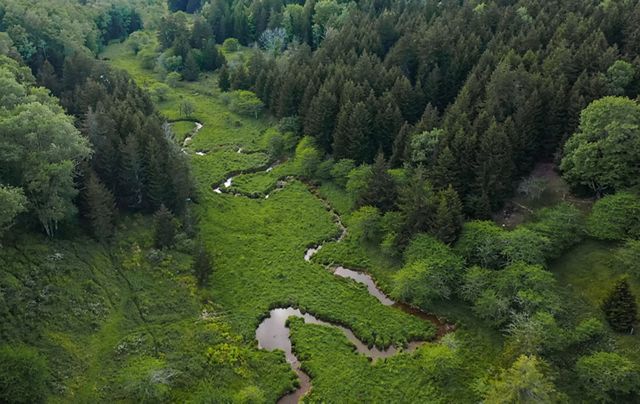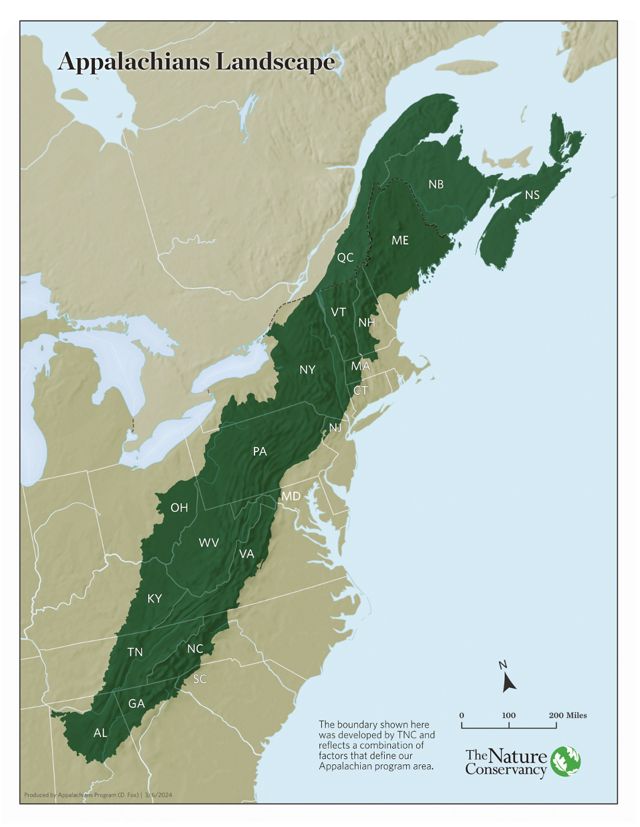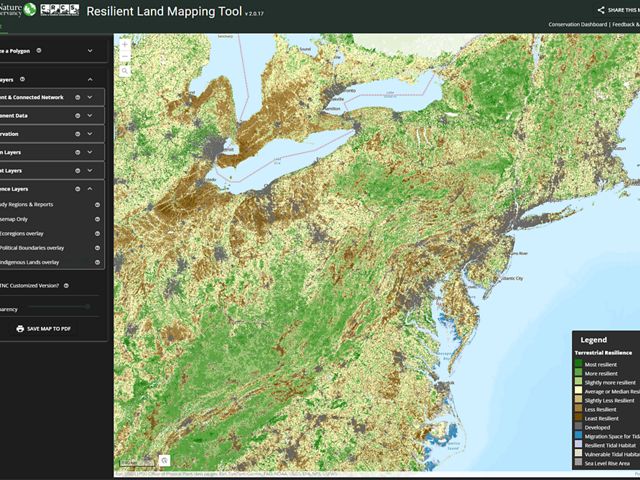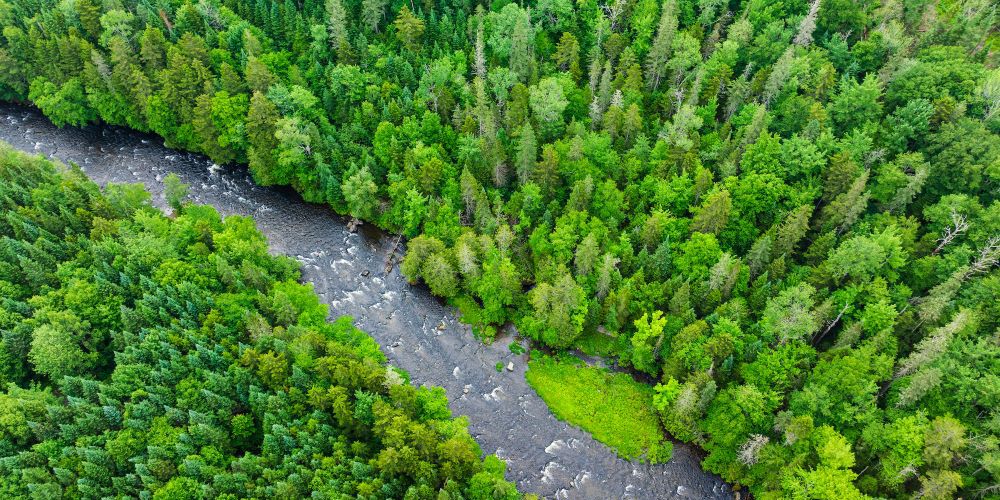
To make the highest possible impact on the climate and biodiversity crises, The Nature Conservancy is committed to advancing solutions and supporting partners throughout the Appalachians to connect and conserve vital wildlife habitat, build resilience to the impacts of climate change, and generate new job and recreation opportunities for communities.
Approximately one-third of the U.S. population lives in or within 100 miles of the Appalachians, including an estimated 36 million people that rely on the region for sources of drinking water. The landscape contains the world's largest remaining expanses of temperate broadleaf mixed forest and provides habitat to a wide diversity of plants of animals, many of which are listed as rare, threatened, or endangered. Conserving this landscape is critical for nature and for the people that live and work there.
However, as climate change drives ecosystem instability, plants and animals are shifting their ranges northward, and people are having to find ways to adapt to complex and intertwined challenges. TNC and many others have been working to conserve vital Appalachian habitats for decades. Now we must ramp up our efforts and coordinate with partners across the Appalachians for maximum impact.
Spanning from northern Alabama to the Canadian Maritimes, the Appalachians are a high priority for conservation by TNC.
To succeed in these efforts, The Nature Conservancy’s Connectivity, Climate, Communities Fund offers two grant programs for conservation and community organizations, municipalities, Federally Recognized Tribal Nations, and local and state agencies in the Appalachians who are working to protect and conserve this region:
The Resilient and Connected Appalachians Grant Program
Ready to Apply?
Apply NowThe Resilient and Connected Appalachians Grant Program (learn more below on this page) provides grants of up to $100,000 for fee and easement acquisition projects throughout the Appalachians. Eligible states include Maine, Vermont, New Hampshire, Massachusetts, Connecticut, New York, New Jersey, Pennsylvania, Ohio, Maryland, West Virginia, Virginia, Kentucky, North Carolina, South Carolina, Tennessee, Georgia, and Alabama.
The New York Climate Resilience Grant Program
Looking for The New York Program?
Learn MoreFor organizations based in New York, the Climate Resilience Grant Program offers up to $50,000 for fee and easement acquisition projects and up to $25,000 for projects that strengthen organizational capacity for protecting resilient lands, secure vital floodplains and shorelines and help communities adapt to climate change.
Which grant program is right for you?
- If your project is located in one or more of the 18 eligible states listed for the Resilient and Connected Appalachians Grant Program, view program details on this page, below. New York projects that protect resilient and connected lands within the mapped focal areas and are greater than 500 acres are eligible for this program.
- If your project is located in New York and is less than 500 acres or will protect floodplains wetlands or shorelines outside of the mapped focal areas, visit the Climate Resilient Grant Program webpage. This program also funds projects that strengthen organizational capacity for land protection and climate adaptation projects.
- If unsure, email CCCFund@tnc.org for additional guidance on which program is right for your project.

2026 Resilient and Connected Appalachians Grant Program

The Nature Conservancy (TNC) is pleased to offer a third round of funding through its Resilient and Connected Appalachians Grant Program (RCAGP).
The goal of the program is to support exceptional land protection projects that contribute to landscape-scale conservation and connectivity within TNC’s Appalachians Program area.
The program geography includes all or portions of Maine, Vermont, New Hampshire, Massachusetts, Connecticut, New York, New Jersey, Pennsylvania, Ohio, Maryland, West Virginia, Virginia, Kentucky, North Carolina, South Carolina, Tennessee, Georgia, and Alabama.
Last year the RCAGP awarded $1 million in support of 15 projects that conserved over 17,000 acres across the Appalachians. Project descriptions funded last year can be found here.
The total amount of funding this year is $1.1 million. Grants of up to $100,000 are available to land trusts and other non-profit 501(c)(3) organizations with a conservation-related mission, academic institutions, Federally Recognized Tribal Nations (as well as affiliated non-profits applying on their behalf), municipalities and local agencies
The Resilient and Connected Network and the Appalachian Focal Areas

Resilient Land Mapping Tool
TNC’s interactive Resilient Land Mapping Tool is a publicly-accessible map viewer. Use of the mapping tool is not a requirement of this program—it is provided here as a resource to use anytime for evaluating the conservation value of any parcel or tract in North America.
Eligible projects will permanently conserve lands that are within or intersect with the Resilient and Connected Network (RCN) and the program’s focal areas.
The Nature Conservancy’s Resilient and Connected Network is a data-rich map that identifies the representative, climate-resilient sites needed to sustain biodiversity and ecological functions into the future. It shows where plant and animal species have the best chance to move away from growing climate threats and find new places to call home. Protecting and sustaining these lands collaboratively is critical for a climate resilient future.
Projects must be within or intersect with Appalachian focal areas. Focal areas are landscape-scale geographies that represent concentrated occurrences of the RCN and also provide the most viable corridors of connectivity through the Appalachians.
The Nature Conservancy’s Appalachians Program boundary, the RCN, and the focal areas can be explored in the Resilient and Connected Appalachians Map Viewer.
Community Benefits and Engagement
The Nature Conservancy believes that durable conservation results when people and communities are engaged in projects and benefit from their outcomes. The RCAGP invites projects that conserve natural resources, benefit biodiversity, advance connectivity and help meet the needs of local communities.
Projects supported by the RCAGP will demonstrate specific actions for engaging communities and articulate tangible benefits for people. The grant application provides a list of community benefits and engagement categories to choose from and leaves space for additional activities not listed. Applicants are asked to explain their choices with specific reference to how community benefits and engagement will be embedded within their project. How well projects engage local people and groups in project design, collaborative management, two-way learning (between organizations and communities), or other related approaches are a part of the project evaluation and scoring criteria.
Some examples of community benefits and engagement include providing greater access to nature for people of all abilities, protecting drinking water sources, enhancing recreational and resource-based economic opportunities, flood mitigation, or protecting lands that will meet a community-defined conservation or other needs. Community engagement includes actions taken to seek input and invite participation in the project’s development and outcomes from external partners and local community members.
Additional context and examples of community benefits and engagement from successful applications in previous rounds can be viewed here.
Application Process
Things to Know
-
The program is open to all land trusts and other non-profit 501(c)(3) organizations with a conservation-related mission, non-profit academic institutions, Federally Recognized Tribal Nations (as well as affiliated non-profits applying on their behalf), municipalities and village, town and county agencies that operate within the Appalachians boundary.
-
- Projects must be located in TNC’s Appalachians Program boundary which includes portions of Maine, Vermont, New Hampshire, Massachusetts, Connecticut, New York, New Jersey, Pennsylvania, Ohio, Maryland, West Virginia, Virginia, Kentucky, North Carolina, South Carolina, Tennessee, Georgia or Alabama.
- Projects must include lands that fall partly or fully within the Resilient and Connected Network.
- Projects must be within or intersect with a focal area.
- Projects may include multiple parcels, but the parcels should be adjoining and under the same ownership. Projects with multiple, non-adjoining parcels or more than one owner may be considered—please reach out to discuss before applying.
-
The Resilient and Connected Appalachians Grant Program is aimed at advancing landscape-scale conservation outcomes. Projects will be evaluated on the following criteria:
- Location: the project is within TNC’s Appalachians Program boundary and within a mapped focal area. Projects with outstanding conservation values and compelling community engagement attributes that are outside of but close to a focal area may be considered as funding allows. Please reach out to discuss before applying.
- Resilience: the percentage of the total project area that is part of the Resilient and Connected Network.
- Connectivity: the project is adjacent to other protected lands or otherwise demonstrates evidence that it will promote landscape connectivity over time (e.g., the project is a necessary acquisition for advancing a local or regional plan that aims to protect a critical conservation corridor).
- Collaboration: evidence of engagement with other organizations, community groups, or local governments (including, but not limited to, shared funding).
- Community: project embeds elements that directly engage communities and benefit people.
- Timing: the project will close within 12 months from the start of the grant agreement term (June, 2026).
- Feasibility: likelihood that the project will close and the costs seem reasonable.
-
Applicants may request up to $100,000. Grant awards may be less than the amount requested. Eligible project costs include the following:
- Project capital (purchase price)
- Project development (appraisals, surveys, title work, baselines, environmental assessments, etc.)
- Stewardship and legal defense funds (does not include direct stewardship, land management or restoration)
- Community engagement costs related to project (meeting venue, mailers, supplies, travel, facilitation, etc.)
- Match for other private or public funding sources
- Legal support
- Operational costs (e.g., staff salaries and travel expenses directly associated with the project)
- Indirect costs (not to exceed 20% of the total grant amount)
Funds will be provided to grantees at the start of the grant agreement term, except for grants, or portions of grants that are requested for stewardship and legal defense funds, which will be paid after the project closes.
Ineligible Expenses
- Lobbying fees and costs
- Direct stewardship, land management or restoration
-
Application window opens
November 3, 2025
Informational webinar
January 21, 2026
Application window closes
February 13, 2026
Award notification
May-June, 2026

Note: The application is completed and submitted through SurveyMonkey’s Apply platform. You will be prompted to create a login, which will allow you to work on your application, save your work and collaborate with others in your organization.
Land trusts that are accredited by the Land Trust Accreditation Commission must provide documentation showing that they are and will remain accredited through the start of the grant term. Non-accredited organizations will need to provide additional documentation about their governance structure and financial health in the application. Municipalities and agencies may also be asked for information related to their capacity for owning and managing conservation lands —see FAQs for more information.
Applicants may only submit one project per year. An applicant may collaborate on or be party to another project that has a different lead applicant.
Applications must include:
- All required fields in the application
- Maps and other project-specific attachments
- Project budget (including budget worksheet and narrative in the application)
- Organizational documentation as noted in the application
For general questions about the program or technical assistance, email us at cccfund@tnc.org.
Prior to submitting an application, applicants are strongly encouraged to discuss their project with the representative for their state, which can be found in the list below.
Alabama |
Steve Northcutt |
|
Connecticut |
Sarah Pellegrino |
|
Kentucky |
Holly West |
|
Maine |
Abby King |
|
Maryland |
Donelle Keech |
|
Massachusetts |
Rich Cavanaugh |
|
Georgia |
Anne Flinn |
|
New Hampshire |
John Plummer |
|
New Jersey |
Tricia Aspinwall |
|
New York |
Matt Levy |
|
North Carolina |
Justin Boner |
|
Ohio |
Terry Seidel |
|
Pennsylvania |
Mari-Beth DeLucia |
|
South Carolina |
Katy McWilliams |
|
Tennessee |
Gabby Lynch |
|
Vermont |
Gannon Osborn |
|
Virginia |
Meg Short |
|
West Virginia |
Isa Bryant |
Applications are due by 11:59 PM on February 13, 2026
We Can't Save Nature Without You
Sign up to receive monthly conservation news and updates.
